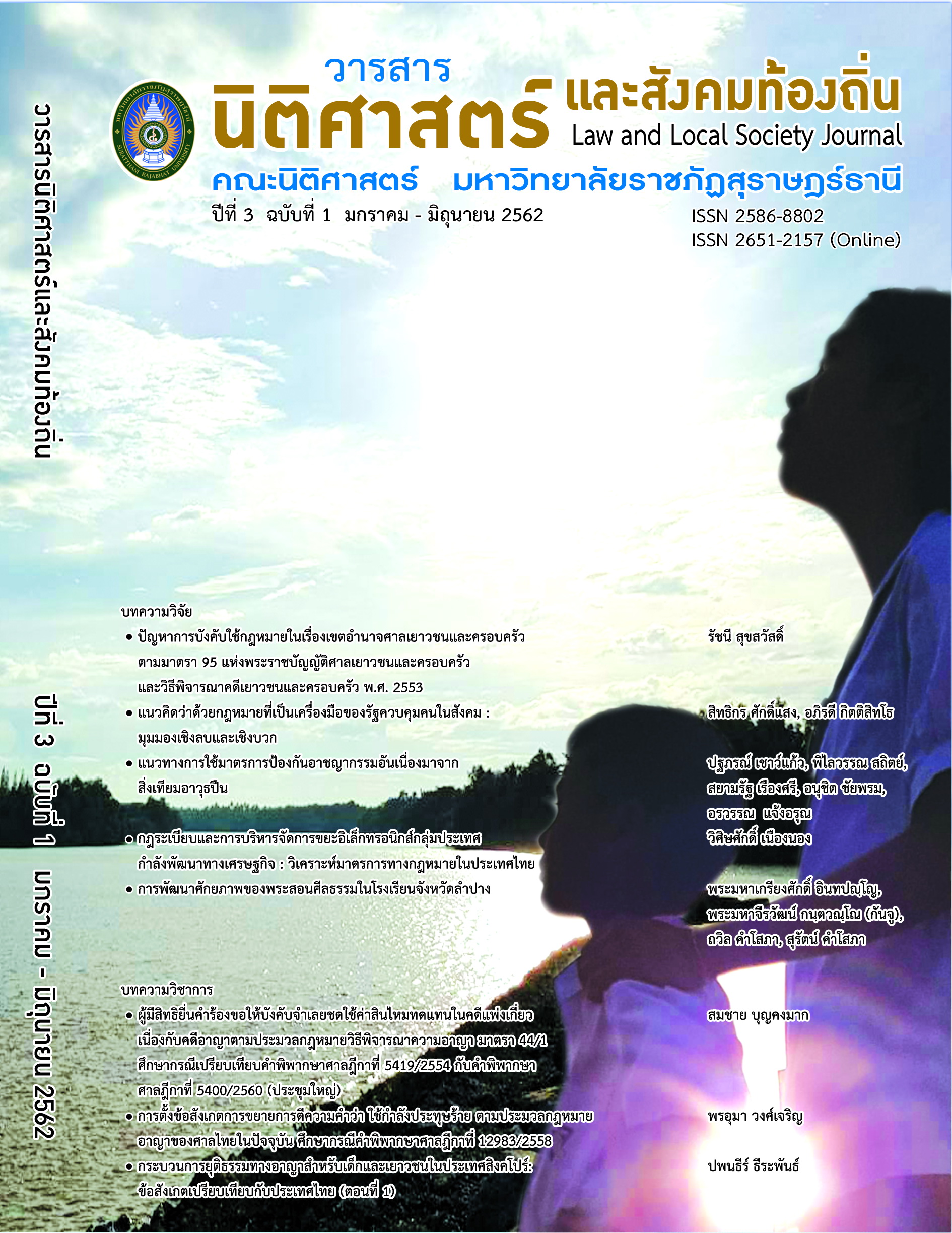Elaboration of Interpretation of Term "Assault" according to the Criminal Code of Thailand's Courts: Case Study of Judgment No. 12983/2558
Keywords:
Extensive Interpretation, Assault, Criminal Code, Supreme Court DecisionAbstract
This article studies the meaning of term “Assault” according to Section 1 (6) of the Criminal Code since the Supreme Court Decision No. 12983/2558 put an extensive interpretation on the term. In this case, the accused installed closed-circuit camera under a prosecutor’s desk covertly. The circumstance was interpreted as lust and sexual desire without the prosecutor’s awareness or consent so the prosecutor could not resist. Even the accused did not touch the prosecutor’s body directly, the Supreme Court considered its conduct as the assault.
Term “Assault” means committing assault upon person’s mind and body. The Supreme Court decided that such conduct was the assault upon mind which constituted all elements of indecent assault and battery crime according to the Criminal Code. In the past, a Supreme Court decision interpreted the assault as crime only if a victim is touched physically or used force against. Hence, this extensive interpretation of Supreme Court protects women’s rights so that no one could use technological tools for indecent assault. Similarly, Republic of Korea found this effect and mass protest was staged by female people calling for government’s measure to prevent the problem.
The author agrees with this Supreme Court decision’s interpretation and suggests that the legal amendment should be made. The newly-introduced law establishes the particular offence of indecent assault and battery with technology to protect person from sexual assault.
References
กิตติศักดิ์ ปรกติ. “หลักทั่วไปเกี่ยวกับการใช้การตีความกฎหมาย.” ใน การใช้การตีความกฎหมาย: งานวิชาการรำลึกศาสตราจารย์จิตติ ติงศภัทิย์ 100 ปี ชาตกาล. พิมพ์ครั้งที่ 13. กรุงเทพฯ: สำนักพิมพ์มหาวิทยาลัยธรรมศาสตร์, 2552.
เกียรติขจร วัจนะสวัสดิ์. กฎหมายอาญา ภาคความผิด เล่ม 4. พิมพ์ครั้งที่ 1. กรุงเทพฯ: พลสยามพรินติ้ง (ประเทศไทย), 2551.
เกียรติขจร วัจนะสวัสดิ์. คำอธิบายกฎหมายอาญา 1. พิมพ์ครั้งที่ 8. กรุงเทพฯ: สำนักพิมพ์มหาวิทยาลัย ธรรมศาสตร์, 2546.
คณิต ณ นคร. กฎหมายอาญาภาคความผิด. พิมพ์ครั้งที่ 5. กรุงเทพฯ: วิญญูชน, 2559.
คำพิพากษาศาลฎีกาที่ 877/2501
คำพิพากศาลฏีกาที่ 501/2503
คำพิพากศาลฎีกาที 1279/2506
คำพิพากศาลฏีกาที่ 3953/2539
คำพิพากษาศาลฎีกาที่ 4066/2545
คำพิพากษาศาลฎีกาที่ 1904/2546
จิตติ ติงศภัทิย์. คำอธิบายประมวลกฎหมายอาญา ภาค 2 ตอนที่ 2 และภาค 3. พิมพ์ครั้งที่ 7. กรุงเทพฯ: วัชการพิมพ์, 2553.
“ฉาว โรงแรมเกาหลีใต้ 10 เมืองใหญ่ติดกล้องแอบถ่ายแขกในห้องพัก.” คม ชัด ลึก. 21 มีนาคม 2562 http://www.komchadluek.net/news/hotclip/366431 (สืบค้นเมื่อวันที่ 30 มีนาคม 2562).
ธานินทร์ กรัยวิเชียร และวิชามหาคุณ. การตีความกฎหมาย. พิมพ์ครั้งที่ 3. กรุงเทพฯ: คณะนิติศาสตร์ จุฬาลงกรณ์มหาวิทยาลัย, 2539.
ธานินทร์ กรัยวิเชียร. “การใช้การตีความกฎหมาย.” ใน การใช้การตีความกฎหมาย: งานวิชาการรำลึกศาสตราจารย์ จิตติ ติงศภัทริย์ 100 ปี ชาตกาล, พิมพ์ครั้งที่ 13. กรุงเทพ: สำนักพิมพ์มหาวิทยาลัยธรรมศาสตร์, 2552.
ธานินทร์ กรัยวิเชียร. หลักการตีความกฎหมายตามครรลองของหลักนิติรัฐและนิติธรรม. วารสารจุลนิติ 7. ฉ.4 (2553): 4–13.
ประมวลกฎหมายแพ่งและพาณิชย์
ประมวลกฎหมายวิธีพิจารณาความอาญา
ประมวลกฎหมายอาญา
พระเจ้าลูกยาเธอ กรมหมื่นราชบุรีดิเรกฤทธิ์. กฎหมายลักษณะผัวเมีย. กรุงเทพฯ: กอง ลหุโทษ, ร.ศ. 120. อ้างถึงใน ศิวดี เกิดเจริญ. “ผลกระทบจากการบัญญัติแก้ไขเพิ่มเติมความผิดฐานข่มขืนกระทำชำเราตามพระราชบัญญัติเพิ่มเติมประมวลกฎหมายอาญา (ฉบับที่19) พ.ศ. 2550 ต่อความผิดฐานอนาจาร” วิทยานิพนธ์ปริญญามหาบัณฑิต คณะนิติศาสตร์, จุฬาลงกรณ์มหาวิทยาลัย, 2550.
พระยาเทพวิฑูร (บุญช่วย) วณิกกุล). คำอธิบายประมวลกฎหมายแพ่งและพาณิชย์ บรรพ 1-2 มาตรา 1-240. กรุงเทพฯ: เนติบัณฑิตสภา, 2476.
ภูภณัช รัตนชัย. การตีความกฎหมายอาญา : คดีดูหมิ่นผู้อื่นซึ่งหน้าโดยการใช้โทรศัพท์, วารสารมนุษย์ศาสตร์และสังคมศาสตร์. 8, ฉ.3 (กันยายน-ธันวาคม 2559).
ราชบัณฑิตยสถาน. กฎหมายตราสามดวง ฉบับราชบัณฑิตยสถาน จัดพิมพ์ตามต้นฉบับหลวง เล่ม ๑ กรุงเทพฯ: ราชบัณฑิตยสถาน, 2559.
วรเจตน์ ภาคีรัตน์. การใช้และการตีความกฎหมายมหาชน. วารสารจุลนิติ. 7, ฉ.4 (2553): 55.
วิสิฐ ญาณภิรัต. “รายงานการวิจัย เรื่อง บริบทหลักนิติธรรมในต่างประเทศ.” คณะกรรม การอิสระว่าด้วยการส่งเสริมหลักนิติธรรมแห่งชาติ สำนักปลัดกระทรวงยุติธรรม, (2557).
ศิวดี เกิดเจริญ. “ผลกระทบจากการบัญญัติแก้ไขเพิ่มเติมความผิดฐานข่มขืนกระทำชำเราตามพระราชบัญญัติเพิ่มเติมประมวลกฎหมายอาญา (ฉบับที่ 19) พ.ศ. 2550 ต่อความผิดฐานอนาจาร.” วิทยานิพนธ์นิติศาสตรมหาบัณฑิต, สาขาวิชานิติศาสตร์ จุฬาลงกรณ์มหาวิทยาลัย, 2552.
สิทธิกร ศักดิ์แสง. รวมบทความศาสตร์แห่งการตีความ. กรุงเทพฯ: นิติธรรม, 2556.
หยุด แสงอุทัย. กฎหมายอาญา ภาค 1. กรุงเทพฯ: สำนักพิมพ์มหาวิทยาลัยธรรมศาสตร์, 2556.
หยุด แสงอุทัย. ความรู้เบื้องต้นเกี่ยวกับกฎหมายทั่วไป. กรุงเทพฯ: ประกายพรึก, 2545.
หยุด แสงอุทัย. ความรู้เบื้องต้นเกี่ยวกับกฎหมายทั่วไป. พิมพ์ครั้งที่ 17. กรุงเทพฯ: สำนักพิมพ์มหาวิทยาลัยธรรมศาสตร์, 2552.
หยุด แสงอุทัย. คำอธิบายกฎหมายลักษณะอาญา ร.ศ. 127. พิมพ์ครั้งที่ 7. กรุงเทพฯ: วิญญูชน จำกัด, 2561.
อักขราทร จุฬารัตน์. หลักการตีความกฎหมายตามครรลองของหลักนิติรัฐและนิติธรรม. วารสารจุลนิติ 7. ฉ.4 (2553): 14–28.
อักขราทร จุฬารัตน์. “การตีความกฎหมาย.” web.krisdika.go.th>wcmclta>wcmicl131 (accessed June 10, 2562).
Vgl. Etwa Hermann Blei, StrafrechtI :AllgemeinerTeil, 16, Auflage, München 1975. S.26 ff.; Eberhard Schmidhäuser, Strafrech :AllgemeinerTeil, 1. Auflage, Tübingen 1970 S. 83; paulBockelmann, Strafrech: Allge meinerTeil, 3. Auflage, München1979,S. 19 ff.; Harro Otto, Grundku rsStrafrech : Allgemei nerStrafrechtslehre, 7. Auflage, Berlin 2004, § 2 randnummer41-53, S. 26 ff.; Heinrich Jescheck, Lehrbuch desStra frech: AllgemeinerTeil, 4. HansAuflage, Berlin 1988 S. 137 ff. อ้างถึงใน คณิต ณ นคร. กฎหมายอาญาภาคความผิด. พิมพ์ครั้งที่ 5. กรุงเทพฯ: วิญญูชน, 2559.
Downloads
Published
How to Cite
Issue
Section
License
Articles published are copyright of local law and society journals. Faculty of Law Surat Thani Rajabhat University
Content and information in articles published in local law and society journals It is the opinion and responsibility of the author of the article directly. which the journal editor It is not necessary to agree or share any responsibility for articles, information, content, images, etc. published in local law and society journals. It is the copyright of the local jurisprudence journal. If any person or entity wants to distribute all or part of it or to take any action must have prior written permission from the local jurisprudence journal only.


